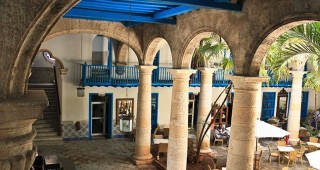 (+53)7862 - 0979
(+53)7862 - 0979Printmaking in Cuba dates back to the 18th century with the illustration of saints and shields, enriched in the 19th century with vignettes of sugar mills and local customs, travelers’ albums, and the dressings on cigars. In 1959, printmaking became a subject in the art education system, becoming an independent specialty. In July 1962, the experimental printmaking workshop on Plaza de la Catedral was established by Cuban artist Orlando Suárez and Chilean painter José Venturelli using old printing stones and machinery that had been used for cigar decorations. Since its beginnings, the workshop focused purely on artistic projects and has been open to the most important Cuban printmakers, who have carried out an intensive work of creation and experimentation, a crucial factor in the boost experienced by the art of printmaking at present.
The small Galería del Grabado upstairs sells excellent, non-touristy prints, including etchings, lithographs, woodcuts and collagraphs.
The workshop also offers courses on traditional lithography (using stone), woodcuts, and etchings (using metal). Courses for foreigners come highly recommended and include one-on-one instruction by highly specialized professors and all supplies. Expect to pay around $250 for a month-long course and less for shorter periods.










 Colonial
Colonial



